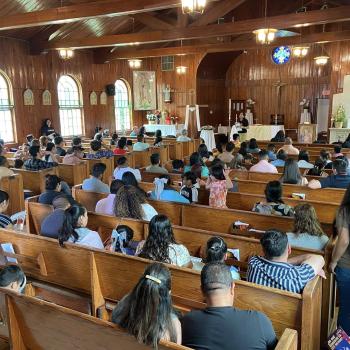In the midst of World War II, Franklin D. Roosevelt came across a newspaper clipping about the ancestry of England's Prime Minister Winston Churchill and his wife, Clementine. The newspaper article noted the couple's common heritage with Mormons in Utah. As Roosevelt and Churchill had become friends by this time, the president sent the clipping to the prime minister, accompanied by a lighthearted letter.
"Hitherto I had not observed any outstanding Mormon characteristics in either of you," he wrote. "But I shall be looking for them from now on." He further added, "I have a very high opinion of the Mormons . . . they are excellent citizens."[1]
More recently, one Orthodox Christian commentator observed that the faith produces "exemplary people" who in turn "make good neighbors."[2]
Today there is a growing body of independent research suggesting that members of The Church of Jesus Christ of Latter-day Saints, sometimes nicknamed "Mormons," do indeed make good neighbors and citizens.
Recent studies reveal that practicing Latter-day Saints tend to be healthier, happier, better educated, and more committed to family values. They are also more likely to be socially connected and engaged in volunteerism and charitable giving. This link between what faithful Latter-day Saints believe and what they feel impelled to do with that belief is an incredibly powerful force within the faith.[3] This is not to say that Church members do not experience difficult struggles and serious problems—I know firsthand that they do. Rather, it simply implies that the faith and lifestyle of church-attending Latter-day Saints provides a unique resource that helps to meet life's challenges. In turn, these Church members are well equipped to lend a hand in the communities where they live.
Health
The Latter-day Saint health code is one of the faith's most distinguishing features. Given by revelation to the Church's founding prophet, Joseph Smith, the code encourages eating grains, fruits, vegetables, and herbs, but strongly discourages using tobacco and consuming alcohol, tea, and coffee. In addition, practicing Latter-day Saints forgo food for 24 hours once a month as a fast. Subsequently, they donate what they don't spend on meals to the poor as "fast offerings" or alms. This religiously influenced diet has a profound effect on the lifelong physical health of adherents.
To better understand this effect, Dr. James Enstrom at the UCLA School of Public Health looked at populations that have been practicing the faith for an extended period of time. Enstrom's 25-year longitudinal study focused on members of the Church in California and concluded that these individuals—particularly those who were married, had never smoked, attended church weekly, and had at least twelve years of education—had total death rates that were among the lowest ever reported for a well-defined group followed for 25 years.[4] They also had "among the longest life expectancies yet reported."[5] The average life expectancy of Latter-day Saint women was 86.1 years—five and a half years longer than comparable females in the United States. Latter-day Saint males had a life expectancy of 84.1 years—nearly ten years longer than that of comparable males.[6] The authors of this study have been publishing results periodically, and the most recent update, completed in 2007, made the following comment: "The low death rates . . . observed during the first 8 years [of this study] have persisted for 25 years."[7] It is impressive that these results have been sustained for so long.
A separate research effort identified the heart health benefits associated with fasting. Researchers at Intermountain Health Care found that people who fasted once a month, as do Latter-day Saints, were about 40 percent less likely to be diagnosed with clogged arteries than those who did not regularly fast.[8] Medical professionals had thought for decades that tobacco use probably accounted for essentially all of the difference in heart disease rates between Latter-day Saints and others. But after controlling for smoking, researchers still saw a lower rate of heart disease among Church members. They designed a study to figure out why.
They focused on other Latter-day Saint practices: monthly fasting; avoiding tea, coffee, and alcohol; taking a weekly day of rest; going to church; and donating time and money to charity. Only fasting made a significant difference. Surprisingly, the difference persisted even when researchers took into account weight, age, and conditions like diabetes, high cholesterol, or high blood pressure.[9] It is clear that the practices associated with being a faithful Church member, including fasting, lead to greater health and longevity.
Happiness
While better health also contributes to personal happiness, many other factors enter into the high levels of life satisfaction reported by Latter-day Saints. In their landmark book American Grace, authors Robert Putnam and David Campbell survey extensive research suggesting a positive relationship between religion and life satisfaction—put simply, they say, "many researchers have found that religious people are happier."[10] Mormons, of course, are no exception. In 2009, both Gallup and Forbes identified Utah, the state with the highest concentration of Mormons, as having citizens with the greatest levels of "wellbeing" or "quality of life."[11]




